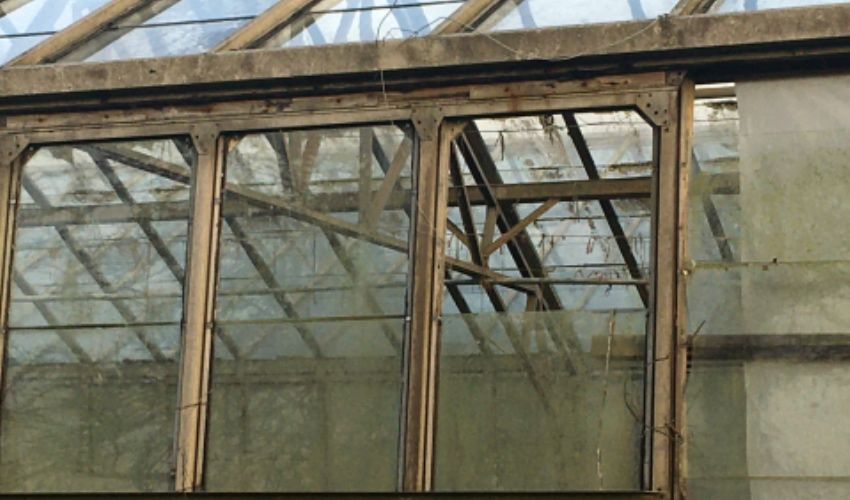

After decades of discussion over what to do with derelict and redundant glasshouse sites, the Environment Minister has published planning guidance which sets out whether these could be developed into new homes.
Islanders are being invited to comment on the draft supplementary guidance, which would aim to help potential developers assess whether a site could be considered suitable for residential use under the current Island Plan policy.
Environment Minister Jonathan Renouf said that in "some circumstances", and for the "right sites", a "limited amount of residential development" could be suitable.
Express took a closer look at the existing policy and the proposed new guidance...
Of the 155,000sqm of glasshouses remaining in Jersey (the equivalent of 29 football pitches), just over half were being "used for production", according to figures relating to 2016.
Pictured: A derelict and redundant glasshouse. (Peter Mourant)
The total area of land farmed under glass in Jersey has decreased by 37% since 2013 and, of the remaining glasshouses, nearly 97% are more than 15 years old.
Technically, yes – the Bridging Island Plan policy on derelict and redundant glasshouses states that redevelopment for non-agricultural uses would generally “not be supported” and that redevelopment for other uses would be considered “in only the most exceptional circumstances”.
However, in the "most exceptional circumstances", existing Island Plan policy allows consideration of the development of derelict glasshouse sites for other uses, provided that the amount of development is the "minimum required to deliver an overall improvement to the landscape character of the countryside through the removal of glasshouses and supporting infrastructure; and the restoration of the remaining agricultural land, or an appropriate environmentally beneficial use."

Pictured: The Bridging Island Plan policy on derelict and redundant glasshouses states that redevelopment for non-agricultural uses would generally “not be supported”.
The Bridging Island Plan policy states: "Exceptionally, under Policy ERE6, consideration may be given to limited non-agricultural development to enable the delivery of significant environmental benefits in the countryside through the removal of glasshouses and supporting infrastructure; the restoration of the majority of the agricultural land; and the repair of the landscape."
Therefore, the policy provides a potential route for the redevelopment of glasshouse sites to be considered under its exception provisions but it is unequivocal in stating that: "The redevelopment of redundant and derelict glasshouses for non-agricultural uses will not be supported. When glasshouses are redundant to the horticultural industry or are derelict, they should be removed, and the land restored to agricultural use."
The exception provision only applies when structures are both derelict and redundant (precise definitions for these are provided in the guidance).
The planning guidance makes clear that these are tricky to define, saying: "Exceptional circumstances are, by definition, unusual and often unique and, as such, it is not possible to list situations that may be regarded as being 'exceptional' from a planning perspective."
These are circumstances whereby the clearance of glass and the development of a site, or part of a site, for other uses outside of the built-up area may be supported.
They include where other more appropriate forms of development suited to a countryside location have been explored and discounted for justifiable reasons, and where the proposed location is "justified, appropriate and necessary" for residential development.
However, it notes that some sites are not suitable because of their "remoteness and lack of existing infrastructure".

Pictured: Environment Minister Jonathan Renouf, who has responsibility for planning.
Developers must also prove that their proposals are the "minimum required to deliver an overall improvement to the landscape character of the countryside through the removal of glasshouses and supporting infrastructure".
Finally, the guidance outlines the "level of potential support" for an application when measured against various criteria including "within the built-up area", "country-side location, in close proximity to a built-up area". Those nearer existing developments would be more likely to receive support.
Deputy Renouf said: "The presence of derelict glass can be a scar on the countryside, and I want to explore, within the framework of existing Island Plan policies, whether there are some sites that are capable of new uses, where this is limited in scale but sufficient to clear the glass.
"In some circumstances, for the right sites, this may also enable the provision of a limited amount of residential development.
"Before considering the adoption of this guidance, I want to seek the views, in particular, of those in the agricultural industry, along with anyone else with an interest in this matter."
Islanders can comment before 23 February by sending an email to islandplan@gov.je or a letter to Draft SPG Public Consultation, Place and Spatial Planning, Cabinet Office, Government of Jersey, 19-21 Broad Street, St Helier, JE2 3RR.
You can read the full draft guidance online HERE.
Pictured top: Another potential site for re-development. (Peter Mourant)
Comments
Comments on this story express the views of the commentator only, not Bailiwick Publishing. We are unable to guarantee the accuracy of any of those comments.